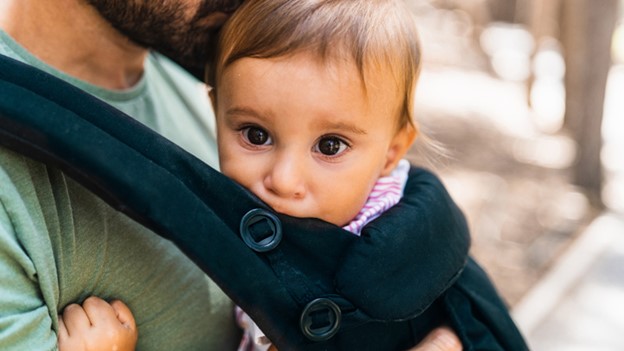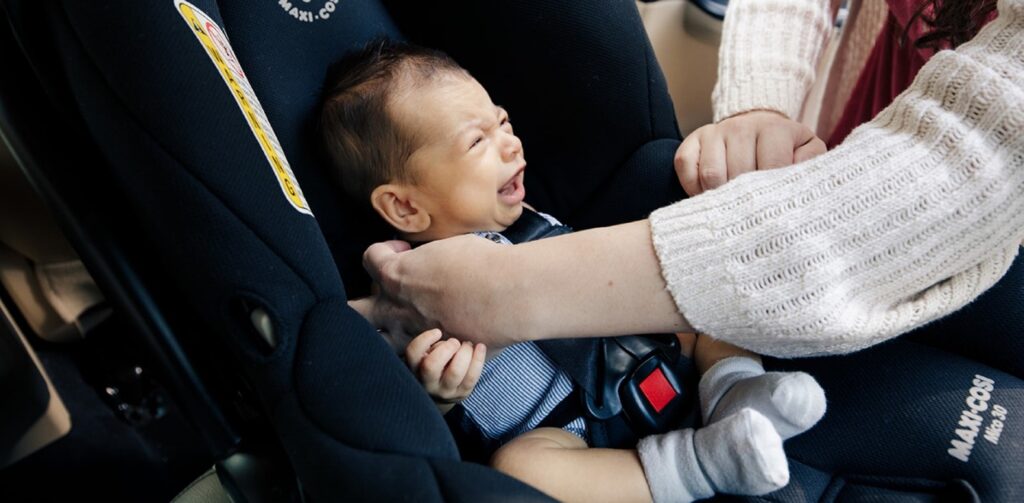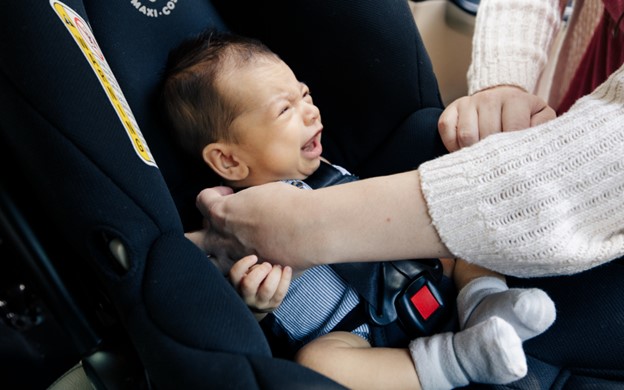As an Amazon Associate I earn from qualifying purchases.
Many parents face the challenge of their baby hating car rides. This can make traveling stressful and difficult.
Babies often dislike car rides due to various reasons like discomfort, fear, or boredom. Parents struggle to keep their little ones calm during trips. Understanding why a baby hates car rides is crucial to finding solutions. Some common reasons include improper car seat positioning, lack of visual stimulation, or even motion sickness.

Simple adjustments can make a big difference. Ensuring the car seat is comfortable and secure, providing engaging toys or playing soothing music might help. Always prioritize safety and comfort. With patience and a few strategies, car rides can become more pleasant for both baby and parents.
Common Issues
Many parents face challenges when their baby hates car rides. These common issues can turn any trip into a stressful experience. Knowing these challenges can help you find solutions faster.
Crying And Discomfort
One of the most common issues is crying and discomfort. Babies often cry because they feel uneasy in their car seat. They might be too hot, too cold, or just not comfortable.
Parents should check if the car seat fits the baby well. Ensure the straps are not too tight. A poorly fitted car seat can cause pain and irritation.
Here are some tips to reduce crying and discomfort:
- Use a soft, breathable fabric cover on the car seat.
- Make sure the car is at a comfortable temperature.
- Check for any sharp or hard objects in the seat.
Car Sickness
Car sickness can also be a big problem for babies. Symptoms include nausea, vomiting, and dizziness. This makes car rides unbearable for both the baby and the parents.
To help prevent car sickness:
- Feed the baby light meals before the trip.
- Ensure good ventilation in the car.
- Avoid sudden starts and stops.
Parents can also try to keep the baby entertained. Playing soothing music or giving a favorite toy can help.
Preparation Tips
Car rides with a baby can be challenging. Proper preparation makes a huge difference. Below are some tips to ensure a smoother journey.
Packing Essentials
Having the right items can ease the stress of car rides. Make a list of essentials and pack them carefully. Here are some must-have items:
- Diapers
- Wipes
- Extra clothes
- Blanket
- Snacks
- Toys
- Pacifier
Organize these items in a handy bag. Ensure they are easy to reach.
Choosing The Right Time
Timing your trip can affect your baby’s comfort. Here are some tips for choosing the best time:
- Travel during nap times: A sleeping baby is a happy baby.
- Avoid rush hours: Less traffic means a smoother ride.
- Plan for breaks: Schedule stops for feeding and changing.
A well-timed trip can make the ride more pleasant for everyone.
Comfort Strategies
Long car rides can be stressful if your baby hates them. There are a few comfort strategies that can make journeys smoother. Let’s explore these strategies.
Proper Seating
A well-fitted car seat is essential. Ensure the seat is suitable for your baby’s age and weight. Follow these tips for proper seating:
- Use a Rear-Facing Seat: Safer for younger babies.
- Adjust Straps: Straps should be snug but not tight.
- Recline the Seat: Helps in supporting your baby’s head.
Climate Control
Keeping the car’s climate comfortable is crucial. Babies are sensitive to temperature changes. Follow these climate control tips:
- Maintain Cool Temperature: Use the air conditioner during hot weather.
- Warm Up the Car: Ensure the car is warm in winter before placing the baby.
- Sun Shades: Use window shades to block direct sunlight.
Implementing these comfort strategies can help your baby enjoy car rides. Proper seating and climate control are key factors. Make every ride comfortable and stress-free for both you and your baby.
Distraction Techniques
Car rides can be challenging if your baby hates them. The key is to keep them occupied with effective distraction techniques. Here, we will explore some methods to make car rides more enjoyable for your little one.
Toys And Games
Toys and games can be lifesavers during car rides. Choose toys that are soft and safe. Avoid small parts that could be a choking hazard. Here are some ideas:
- Soft plush toys: They are comforting and safe for babies.
- Teething rings: These are great for babies who are teething.
- Interactive toys: Toys with lights and sounds can keep your baby entertained.
Keep a variety of toys handy. Rotate them to maintain interest. A small travel toy bag can be a great investment.
Music And Audiobooks
Music and audiobooks can also distract your baby during car rides. Babies love rhythmic sounds and melodies. Consider these options:
- Lullabies: Soft, soothing music can calm a fussy baby.
- Children’s songs: Upbeat tunes can make the ride fun.
- Audiobooks: Short stories can captivate an older baby or toddler.
Use a playlist of your baby’s favorite songs. This can help establish a routine and provide comfort during the ride.
Feeding Solutions
Car rides can be stressful if your baby hates them. One way to make these trips easier is to focus on feeding solutions. Proper feeding can help keep your baby calm and content.
Timing Meals
Timing your baby’s meals is crucial for a smooth car ride. Feed your baby at least 30 minutes before the trip. This allows their stomach to settle. Avoid feeding right before departure.
Plan your trips around your baby’s feeding schedule. If they nap after eating, this can make the ride easier. Use the table below for a quick guide on timing meals:
| Time Before Trip | Action |
| 1 hour | Prepare and feed baby |
| 30 minutes | Burp and change baby |
| Departure | Start car ride |
Safe Snacks
Safe snacks can help keep your baby occupied. Choose snacks that are easy to eat and not messy. Here are some snack ideas:
- Soft fruits like bananas and blueberries
- Cheese sticks
- Small crackers
- Yogurt pouches
Make sure the snacks are age-appropriate. Always supervise your baby while they eat. Avoid giving snacks that are choking hazards.
Keep a snack bag handy in the car. This way, you can easily reach for snacks when needed. Use the ordered list below for packing snacks:
- Choose non-messy snacks
- Pack in small containers
- Store in an accessible bag
- Supervise your baby while eating
Feeding solutions can make car rides more bearable for your baby. By timing meals and offering safe snacks, you can keep your baby happy and calm.

Routine And Familiarity
Car rides can be challenging if your baby hates them. One effective way to ease this stress is through routine and familiarity. Establishing a consistent schedule and incorporating familiar items can make a significant difference.
Consistent Schedule
Babies thrive on consistency. Create a consistent schedule for car rides. Try to leave at the same time each day. This helps your baby know what to expect. Routine brings comfort to babies.
Here’s a simple example of a car ride schedule:
| Time | Activity |
| 8:00 AM | Morning Drive |
| 12:00 PM | Noon Nap Drive |
| 5:00 PM | Evening Drive |
Try to stick to this schedule daily. This will help your baby get used to the routine.
Familiar Items
Surround your baby with familiar items during car rides. These can be toys, blankets, or even a favorite stuffed animal. Familiar items provide comfort and reduce anxiety.
- Favorite toy
- Comfort blanket
- Stuffed animal
Place these items within reach of your baby. This helps them feel safe and secure. You might also consider playing their favorite music. Music can have a soothing effect and help calm your baby.
Using routine and familiarity can transform stressful car rides into peaceful journeys.
Emergency Preparedness
Traveling with a baby who hates car rides can be challenging. Being prepared for emergencies is crucial. This ensures both safety and peace of mind. Below are key areas to focus on for emergency preparedness.
First Aid Kit
A well-stocked first aid kit is essential in the car. It should include basic items for minor injuries. Here is a list of items to consider:
- Adhesive bandages
- Antiseptic wipes
- Gauze pads
- Medical tape
- Scissors
- Tweezers
- Pain relievers
- Thermometer
- Baby-safe insect repellent
- Instant cold packs
Check and restock the kit regularly. Ensure items are not expired.
Emergency Contacts
Keep a list of emergency contacts in the car. This list should be easily accessible. Consider the following contacts:
- Family doctor
- Local hospital
- Poison control center
- Emergency roadside assistance
- Close family members
By preparing for emergencies, you ensure a safer car ride for your baby. Keep these tips in mind to handle unexpected situations effectively.

Parental Stress Management
Dealing with a baby who hates car rides can be exhausting. The constant crying and fussing can take a toll on any parent. Managing stress effectively is crucial. This section offers valuable tips to help you stay calm and composed.
Mindfulness Techniques
Practicing mindfulness can significantly reduce stress levels. Here are some simple techniques:
- Deep Breathing: Take slow, deep breaths to calm your mind.
- Body Scan: Focus on different parts of your body and relax them.
- Meditation: Spend a few minutes each day in quiet meditation.
These techniques can help you stay centered and calm during stressful car rides.
Support Systems
Having a strong support system is essential. Here are some ways to build one:
| Support System | Benefits |
| Family and Friends | Offer emotional support and practical help. |
| Parenting Groups | Share experiences and get advice from other parents. |
| Professional Help | Consulting a therapist can provide strategies to manage stress. |
Leaning on others can make difficult times more manageable.
By using mindfulness techniques and building a support system, you can better handle the stress of car rides with your baby.
Frequently Asked Questions
Why Does My Baby Not Like Car Rides?
Babies may dislike car rides due to motion sickness, discomfort, or anxiety. Ensure the car seat is comfortable and secure.
How Do You Travel With A Baby Who Hates The Car?
Use soothing music and frequent breaks. Bring favorite toys and snacks. Plan trips during nap times. Ensure comfort with a well-fitted car seat. Engage with calming talk and gentle reassurance.
Why Does My Baby Cry The Whole Car Ride?
Babies cry during car rides due to discomfort, hunger, or needing a diaper change. Ensure their comfort by checking these factors.
Conclusion
Finding solutions for a baby who hates car rides can be challenging. Patience and the right strategies are key. Experiment with different approaches to see what works best. Remember, every baby is unique. Your little one may soon enjoy the journey.
Stay consistent and positive for the best results.
Amazon and the Amazon logo are trademarks of Amazon.com, Inc, or its affiliates.
Leave a Reply